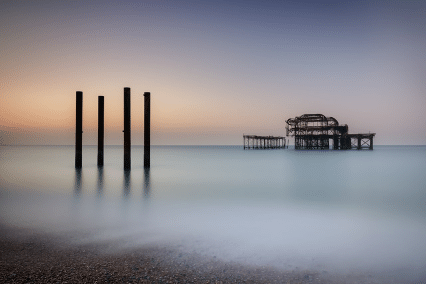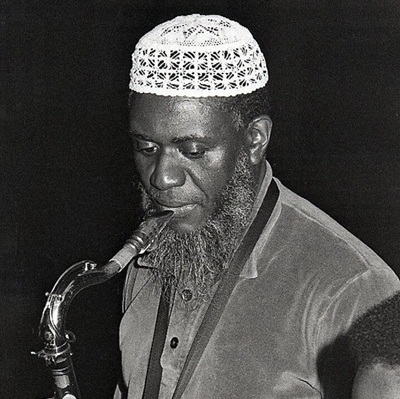.
.
New Short Fiction Award
Three times a year, we award a writer who submits, in our opinion, the best original, previously unpublished work.
J.B. Marlow, a resident of Providence, Rhode Island, is the winner of the 64th Jerry Jazz Musician New Short Fiction Award, announced and published for the first time on December 18, 2023.
.
.
___
.
.
Christerajet, CC BY-SA 4.0, via Wikimedia Commons

.
.
The Old Casino
by J.B. Marlow
.
The old casino would burn. He’d always known it. He didn’t want it to burn, he didn’t want it destroyed. The idea that the crusty red building would disappear actually made him quite sad, but still, he knew it was destined for ashes in the way he knew he wouldn’t live to be older than one-hundred-and-something.
…..The casino stood on the edge of the bay, suspended atop a forest of spindly pilings. Each stilt was black with mussel growth, speckled barnacle grey here and there, aging yet not ancient. Muck sucked at the wood when the tide was dead low. It bubbled and coughed, a living mass of fermenting seaweed and dying, long-buried rock crabs. All this murk was hidden.
…..The deck was wide. It faced the bay in three directions. South, the curving hook of the city peninsula; east, the scattered summer islands; north, white caps and cool, creeping breezes. The walls were brown. The roof was red.
…..Henri first encountered the casino as a boy. Red-haired and soft-cheeked, he followed his parents down the pier, towards the yellow glow. They tittered and grumbled to each other in tones both too low and too boring to understand.
…..“What’s a casino?” he said.
…..Neither parent heard him, so he tugged on Papa’s elbow.
…..“What’s a casino, Papa?”
…..Papa grinned at him.
…..“A party.”
…..Mama laughed.
…..She took Henri’s hand.
…..“If it gets too fun, let me know.”
…..“No such thing as too fun,” said Papa.
…..“No such thing,” said Henri.
…..Mama laughed again. Her broad shoulders shook, thick muscles alive beneath her skin. She reached low and took Henri’s hand, squeezing hard enough to ache.
…..“If I have too much fun, I’ll come outside. If I look lonely, come, and visit.”
…..“We’ll keep you company,” said Henri.
…..“That’s right. Don’t worry, Mama,” said Papa.
…..Inside, people were dancing.
…..Henri couldn’t remember why he went outside, but Mama was already there, leaning against the railing. She watched the city lights, sucking smoke from a hand-rolled cigarette. When she saw Henri, she offered the cigarette.
…..“I’m not old enough.”
…..She giggled, a higher sound than before. Her cigarette arm flexed as she brought it back to her lips. She looked darker than the water below.
…..“Good boy.”
…..“Are you having too much fun?” said Henri.
…..She drew from the cigarette for many seconds and then grinned, letting smoke pour through her teeth. Sparks dripped from her hand. They fell to the old deck planks, glowing like lava before turning to soot. Henri watched each one disappear.
…..“Just enough.”
…..She paused.
…..“Henri, do you think you’ll remember this?”
.
__
.
He was seventeen. The casino’s windows were dark against the scalding blue of sea and sky. Herring gulls screamed above. The air was cool, yet sunlight prickled his exposed arms and neck. He wasn’t wearing sunscreen. His hair was loose, curling about his shoulders, red, salt-stiff. His friends walked beside him.
…..Able was short, seventeen too, yet already scruffy-faced. The girls were younger, sixteen. Angel and Eleanor, not sisters, though they wished they were.
…..They went down the pier bumping shoulders all the way. Able jogged ahead. He tapped on a dark window and peered in. Angel giggled. Eleanor dug an elbow into Henri’s side. He smiled through tight teeth.
…..“Empty,” said Able.
…..“Really?” Angel sounded too interested. She left Henri and Eleanor to join Able at the window.
…..“Well, there’s a couple of chairs and a microphone stand.”
….. She giggled again, her corded bicep touching his.
….. Eleanor prodded Henri’s shoulder with a finger.
….. “Let’s give them space,” she said quietly, though not quite quiet enough. Angel giggled a third time.
….. Henri’s chest felt sodden. He smiled hard.
….. “Okay.”
…..They went out to the end of the deck. Eleanor sat and leaned against the railing, stretching her bare legs towards him. Henri flopped to join her.
…..“They’re so funny.” Her voice was lower than Angel’s. She poked his shin with the toe of her Converse.
….. “Yeah.” Henry’s fingers traced the grain of the deck. He found a nail hole and then another. “Do you think he likes her?” His throat was as narrow as a piece of straw.
….. “I hope so. We should make it happen.” She poked him again and then scooched lower, propping her heel on this knee.
….. “You’re a good footrest, Henri.”
….. Henri looked at the casino’s roof. It was redder than ever, though some of the shingles were chipped. He remembered watching teenagers jump from it, flinging themselves over the deck and into the waves. They’d been younger than him, yet so much braver. His breath was nothing across his tongue. The back of his eyes felt hot.
….. “Henri, Henri, Henri,” strummed Eleanor. Her naked ankle slid to the middle of his thigh. “If they got married, we could be co-best men.”
….. Sweat beaded between them, dripping hot like wax. It stained the deck only for a moment before evaporating. The deck was too warm, the sun was too warm, her skin was too warm.
…..“Eleanor,” he said.
….. “Henri.” Her voice was rich, hopeful.
….. “I like her.”
.
__
.
The ocean was green, churned up by a late-summer storm. Henri flung himself into it, pressing his face deep into the cool. His arms carved water vigorously, and he moved away from the beach. He surfaced, gasped, and went under again. Strands of seaweed tickled the inside of his elbow. When he breathed again, Rachna was beside him. Her eyes were darker than the water. She pinched her nose and blew.
…..“Let’s race to the casino,” she said.
…..“You’ll beat me.”
…..“You don’t know that.”
…..“You’re a swimmer.”
…..“So are you.”
…..She would beat him, she was stronger, born in a house built so close to the water, the yard flooded during full moons. She said something else, though the wind snatched her words. She cackled.
…..“Fine.”
…..She dove under. He realized the race had begun. Despite his inevitable defeat, he swam hard. He kept his fingers pinched tightly together as he stroked, willing himself not to lose. He kicked until his heart rolled against his ribs. Soon, he was beaten.
…..They stood on the deck and pressed their forearms against the top of the railing, warm from the long day’s sun. A bucket of fish heads lent a light putridness to the air. Someone’s tackle box lay open beside it.
…..“Wedding?” said Rachna. Apparently, she had finished gloating.
…..“I think so. I heard music last night.”
…..“When did it stop being a casino?”
…..“Don’t know. I think I was in college. You should ask my mom.”
…..Rachna snorted. Her tongue flicked over her teeth finding a bit of lodged eelgrass.
…..“Funny, imagining her gambling.”
…..“She didn’t go for the gambling.”
…..Rachna watched him for a while.
…..He was comfortable. He rubbed a palm against the wood, letting the friction light his skin on fire. The salt itched as it dried.
…..“I might go fishing tomorrow.”
…..She nodded, then tilted her head back and stared at the sky. Her jaw was faintly scarred from a long-healed welding accident. She was lucky. The tide turned below them, and after a while they left, choosing to walk back instead of swim. Henri gripped her hand harder than necessary. Rachna squeezed back even harder.
.
__
.
It was a firework that did it. Arcing high and blue. It hissed like butter on iron and screamed as it fell, swirling and popping. It fell, bounced twice, and exploded. The casino burned.
.
.
___
.
.

J.B. Marlow lives and writes in New England. He is the founding editor of Rock Salt Journal, a literary magazine for North Eastern stories. He shares an apartment with his partner, Hannah, and their two cats, Charlie and Chester.
.
___
.
.
Click here to read “Company,” Anastasia Jill’s winning story in the 63rd Jerry Jazz Musician Short Fiction Contest
Click here for details about the upcoming 65th Jerry Jazz Musician Short Fiction Contest
Click here to subscribe to the Jerry Jazz Musician quarterly newsletter (it’s free)
Click here to help support the continuing publication of Jerry Jazz Musician, and to keep it commercial and ad-free (thank you!)
.
.
___
.
.
Jerry Jazz Musician…human produced (and AI-free) since 1999
.
.
.

















































My imagination came alive while reading this. Wow!